Can restaurants go green without going broke?
Uncover the overlooked solutions, cost-saving hacks, and legislative fixes that can transform the F&B industry
Welcome to Climate Drift - the place where we dive into climate solutions and help you find your role in the race to net zero.
If you haven’t subscribed, join here:
Hey there! 👋
Skander here.
Here’s a stat that might surprise you: U.S. restaurants generate 33 billion pounds (15 billion kg) of food waste every year and only a fraction of it ever sees a compost bin. The rest? Landfills, methane emissions, wasted resources.
Globally food waste is responsible for 6% of global emissions.
Let’s see how we can change this.
Today driftie Nikole is diving into:
• Why waste management is such a thorny issue (hint: cost + convenience = big hurdles)
• The role legislation could play, and why it’s lacking
• How local solutions are making progress despite minimal incentives
• Where global examples (like Madrid’s robust food waste fines) show us exactly what’s possible
And to show that the Super Bowl wasn’t the only headline in Philly in the last days:
Philadelphia is a prime testing ground for making restaurants more sustainable as we will see.
🌊 Let’s dive in
🚀 Want to make an impact?
The 4th cohort of our accelerator launches beginning of March, and applications are still open (but spots are limited). If you’re ready to fight climate change, don’t wait:
But first, who is Nikole?
Nikole Kenney is a process improvement operations manager with over 15 years of experience, including extensive expertise in hospitality management and fast growth in phase two businesses providing operational support. Recently, she has shifted focus to how she can make a meaningful impact on climate change for future generations. Nikole aims to help hospitality businesses operate sustainably and improve efficiency by leveraging her expertise in LEAN methodologies, project management, and problem-solving talent.
Can restaurants go green without going broke?
For the past 20 years, living in Philadelphia and working in hospitality management has deeply ingrained me in every facet of the industry. My journey has taken me through various roles, from corporate cafes to elaborate event planning, providing me with a comprehensive understanding of the hustle and hands on experience that one can have on a guest and the community. However, beyond the daily grind, I have come to realize the profound impact food and beverage establishments of all sizes can have on the climate and their potential to influence customers' behaviors positively. By championing sustainable practices and offering a heartwarming experience, we have the power to inspire change and make a meaningful difference in our communities and the planet.
Philadelphia is a quintessential American city, with a population of around 1.6 million, making it the sixth-largest city in the U.S. This places it in the middle of the pack compared to other major cities like New York and Los Angeles. Economically, Philadelphia is a diverse city, with strong sectors in healthcare, education, and technology, though its median household income lags behind the national average, reflecting challenges found in many U.S. cities. It is a place where both tradition and innovation coexist, making it a microcosm of the broader American experience.
Let’s take a look deeper into the following areas where innovation and passion lack in Philly around sustainability, specifically in the F&B industry.
Waste management in the hospitality industry is facing significant challenges with little motivation for change.
Small establishments, despite their best intentions, lack the education and resources to implement efficient solutions.
Local vendors offer support, but cost and convenience often take precedence.
The absence of robust legislation and community buy-in is hindering the success of sustainability initiatives.
Let’s Dive In…
It is critical for restaurants to recycle and compost to reduce their environmental impact by diverting waste from landfills and conserving resources. According to the National Restaurant Association, “Restaurants generate an estimated 22 to 33 billion pounds of food waste annually in the United States. With food costs representing 28% to 35% of sales, preventing pre-consumer food waste can significantly boost profitability—every dollar invested in food-waste reduction could yield approximately $8 in cost savings.” While this may sound like a compelling case for restaurateurs, in cities like Philadelphia, recycling programs and composting services are often private and expensive, making these sustainable practices a lower priority for restaurants already struggling to stay afloat. Despite the environmental and financial benefits, implementing such programs remains a challenge for many businesses focused on survival rather than sustainability.
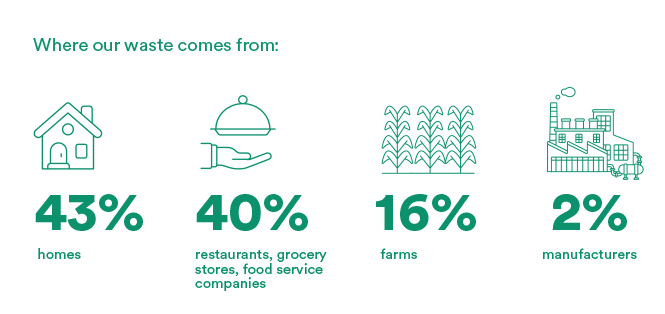
When surveying mom and pop restaurants in Philly, I found that while owners are committed to “doing the best they can” regarding sustainability—whether through composting, recycling, or transitioning to renewable energy – the guidance on how to do so doesn’t exist. In a rocky economy, those struggling to make ends meet aren’t prioritizing these process changes and worry about high costs, assume there are limited resources, and recognize that any change for employees and customers can be difficult. Additionally there is very little legislation or incentives to push these initiatives in Philadelphia but also across the United States. The good news is that this no the case in countries like Italy, France and Spain. Madrid for example can issue fines up to €500,000 after multiple offenses thanks to a new bill approved by Parliament in 2024. (More on that here .)
The Interest Is There But Support Isn’t Localized.
While sustainability-consulting services are available nationally, local and regional interest in consulting remains insufficient. National entities like the National Sanitation Foundation (NSF) and The Green Restaurant Association (GRA) assist restaurant owners in developing tailored sustainability strategies that save money and enhance their environmental impact. These services provide personalized guidance, helping businesses identify cost-effective solutions.
From a business development perspective, Ben Prentice from GRA shared their pride in the substantial growth over the past three years and their excitement to be the industry leader. However, he emphasizes that increased competition would be ideal to achieve the ultimate goal: ensuring all restaurants have the support they need to operate sustainably from the start. While there is a cost associated with these services, they are reasonably priced based on annual sales and can start as low as $1,000 a year, with 1, 3, and 5-year certification contracts available.
This scenario highlights the need for more localized support and increased competition to drive sustainability efforts across the restaurant industry effectively.
Even When Support Is Local, Cost And Convenience Take Priority.
Composting regulations may be lacking in Philly but Bennett Compost is helping to make composting more accessible to restaurants, by offering affordable, convenient solutions to reduce food waste. Owner Tim Bennett shared that while they are composting across the F&B industry from coffee shops to college campuses and event spaces (about 30% of their 1.2 million lbs of waste a year), but there is still a lot of work to be done. “When a busy owner has to consider change in process, cost, convenience and taking up more space in the restaurant, food waste is not a priority.”
Using a service like Bennett Composting can cost as little as $28 a month and per ReFED “every dollar invested in food waste reduction, restaurants can realize approximately $8 of cost savings.
Good News Break
These forward thinking companies are working hard to educate and connect with the next generation and those who may otherwise never not have the means to know how to make a difference in their operations.
Bennett takes time to teach kids about composting in schools across Philadelphia and also delivers back to their properties fresh compost to fun school activities and scholarships. They also have an initiative where they work with the Philadelphia Department of Prisons to host “returning citizens in paid internships as part of early release programs and currently over 25% of our full-time workforce are formerly incarcerated people who had no prior experience in the compost industry.”
GRA has created a free accessible map listing out the legislation that has been passed across the United States to allow an easy first step to education and making changes.
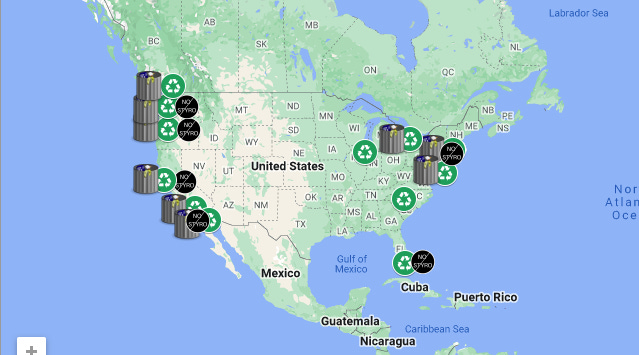
Lack of Legislation = Lack of Motivation
Unfortunately, the map shows that not only Philadelphia but the US lacks comprehensive systems around recycling and sustainability support compared to what is taking place in other parts of the world, particularly Europe. While consumer demand for sustainable practices is growing, the lack of strict regulations, financial incentives, and clear educational resources for restaurants makes it harder for businesses to prioritize sustainability.
The U.S. does have some initiatives to support sustainability, but they are often fragmented and implemented at the state level, without nationwide mandates or consistent enforcement. The EPA's National Recycling Strategy, released in 2021, aims to address major recycling challenges, focusing on improving recycling infrastructure and creating more resilient systems. However, since this strategy is more of a guideline rather than a mandate, local and state governments must enforce recycling practices themselves.
Madrid, on the other hand, has a Healthy and Sustainable Food Strategy, which includes specific action themes and biannual action plans to address various aspects of sustainability, such as food production, distribution, waste reduction, and social equity. Madrid has established a Food Council and a Monitoring Committee to ensure ongoing coordination and assessment of the sustainability measures. This helps maintain accountability and adaptability in their approach. With conducive legislation and the right motivational forces in play, the consulting industry flourishes. Established titans such as RSM Spain, Anthesis, and Deloitte support the F&B leaders in the market, rapidly growing firms like PAXadvising and Ansón+Bonet add a dynamic edge, pushing the industry towards innovation and growth.
By highlighting these differences, it becomes clear that more robust legislation and consistent enforcement can play a crucial role in motivating businesses to adopt sustainable practices.
Sowing the Seeds of Sustainability: Green Solutions for Philadelphia's Restaurants MUST Be Enforced From the Top
Philadelphia's restaurant community stands at a crossroads. To guide them towards a sustainable future, the city must offer more accessible resources, clearer guidance, and financial support. While initiatives such as the Philadelphia Food Waste Business Challenge are in place, they remain largely unnoticed. An intensified campaign is essential, targeting both patrons and businesses. Lining the city's ubiquitous trash cans with informational ads could spread the word, while providing restaurants with proper receptacles to separate food waste can be an immediate improvement. Additionally, incentives like tax breaks or public recognition for sustainable practices will encourage restaurants to embrace green initiatives. In the long term, patrons will enjoy the benefits, and restaurants will find sustainability synonymous with profitability.
Next I hope to dive deeper into the success stories of F&B sustainability in the US, particularly on the west coast in San Francisco and east coast in Miami. Lastly, GO BIRDS!


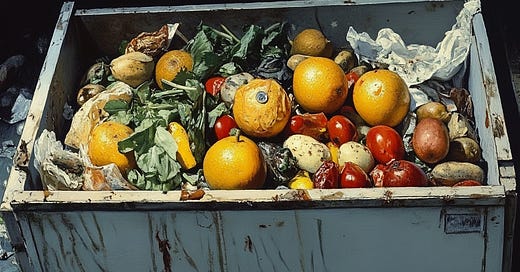




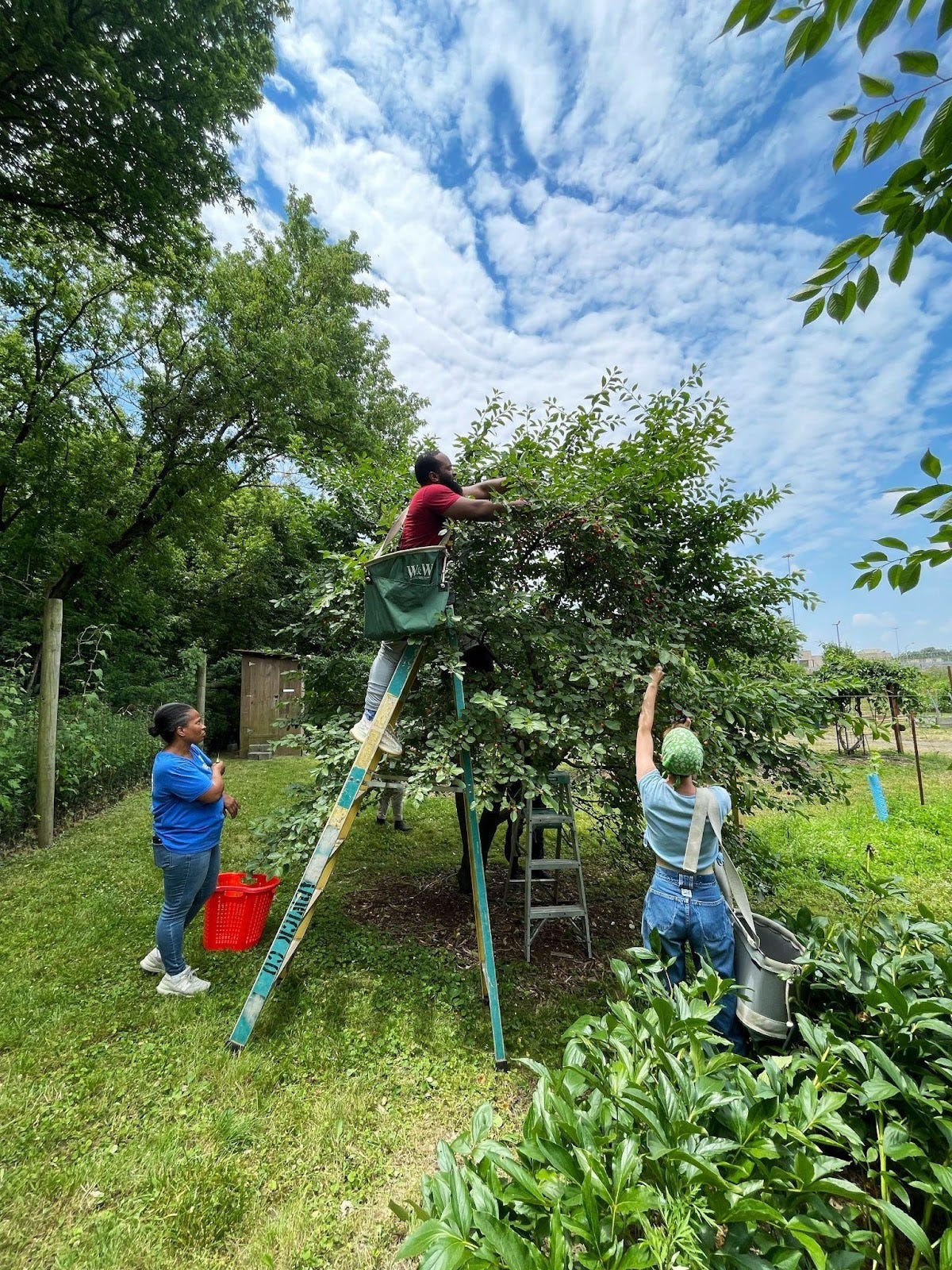
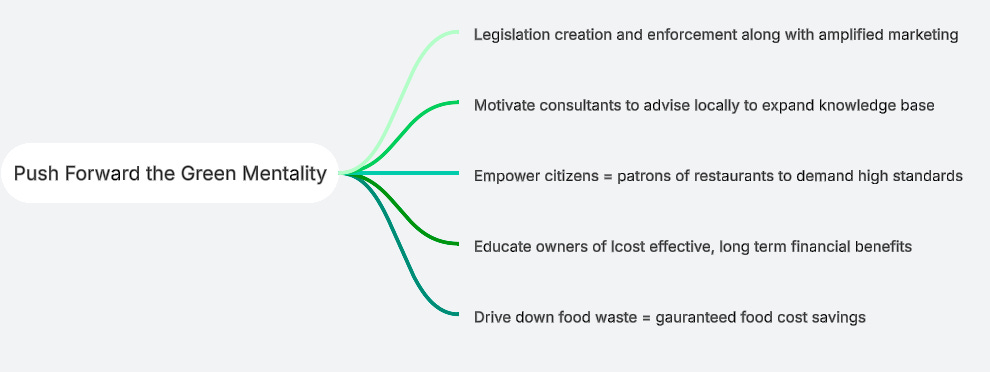


As someone who has run a zero waste cafe, I 100% agree with cost and convenience taking precedence, but that's only because the margins are low (after deducting mon-raw material related operational expenses). Additionally, sustainability in the F&B industry isn't just about recycling and transitioning to green energy. It's about incorporating circular economy and supply chain principles - most of which is slow and labour intensive. For instance, composting requires very little effort for an individual household, however for a restaurant it not only requires space but also additional resources to make that happen. Relying on technology while may be convenient, it's time we take inspiration from permaculture principles to utilise passive energies like heat and wind. It's also critical to develop reduce waste at its source - develop zero waste recipes, manufacture bio enzymes from citrus waste etc. None of this requires heavy investment but requires collaborative effort from multiple players. Hence, our focus should not just be on streamlining the processes, introducing technology but on how to integrate community practices into business ethics and operations too!